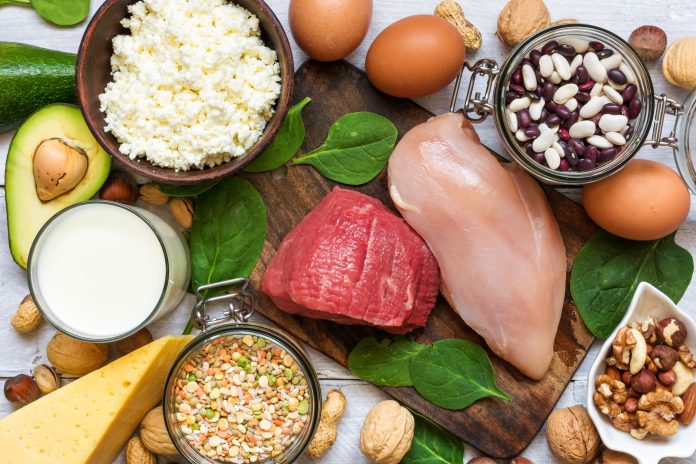Protein is an essential nutrient in the diet, especially for athletes. Whether you’re running long distances, lifting heavy weights, or something in between, protein is one of the most important nutrients to improve your athletic performance, aid in recovery, and make you stronger.
But, it’s not always easy to get enough protein if you’re not focused on it throughout the day.
If you’re an athlete reading this, read on to learn the top benefits of protein for total athletic performance, and how to get enough of it in your diet to reach your goals.
Table of Contents
What is Protein and Why You Need It
Protein is a macronutrient needed to build muscle mass and aid in post-workout recovery, which is essential for optimal athletic performance. A macronutrient is a nutrient needed in large amounts.
There are 3 macronutrients – protein, fat, and carbohydrates (i.e. carbs). Carbs are often thought of as the body’s primary source of fuel for physical activity, but protein plays its own incredibly important and unique role in the diet.
Protein is made up of individual amino acids, or protein-building blocks, which work together to provide strength to your hair, nails, and muscles. For athletes specifically, protein provides several benefits that you cannot get from other nutrients.
During training sessions, your body breaks down glycogen, the storage form of carbohydrates, for energy first. After about 45-60 minutes, however, glycogen stores get depleted.
If there is not enough protein in the body from dietary protein at this time, then the body will begin to break down its own muscle stores for energy. This can reduce muscle mass and lead to fatigue, which is exactly the opposite of what you’d want as an athlete.
Because of this, a high protein diet for athletic performance is paramount.
Protein has been shown in studies to specifically improve performance, reduce muscle soreness, and speed recovery for both endurance and strength training. All of this can make you a better athlete and allow you to train harder.
Here are the top 3 benefits of a high protein diet for athletic performance.
Keeps You Fuller Longer
As one of the most satisfying nutrients, protein can provide long-lasting fuel. This is critical if you’re an endurance athlete, or are trying to curb cravings to maintain a lean runner’s physique.
Protein keeps you full longer because it has a high thermic effect of food (TEF). This means that the body burns more calories by breaking down protein compared to carbs and fats, and this helps to temporarily raise metabolism.
All of this supports you in feeling your best during your workouts so you don’t lose energy. Both protein from food sources and premier protein shakes can help you meet your protein goals.Maintains Muscles
While lifting weights helps to strengthen muscles, you won’t see much in the results department without also consuming enough protein. Combining adequate protein with your exercise regimen will help you rebuild and repair your muscles as you work them during training.
Gaining or maintaining lean muscle is a core goal for many athletes, as it provides strength, improves stamina, and boosts sports performance. Focusing on protein can help you meet these goals.
Aids In Recovery
Perhaps one of the biggest benefits of protein is its role in athletic recovery. As an athlete, there’s nothing more frustrating than having to take a step back because you’re too sore after a workout.
If you ever found yourself incredibly sore, it may be because you didn’t replenish with protein.
When it comes to protein and recovery, both the amount and timing of when you consume protein is key. Consuming protein within an hour of your training session can help you rebuild and repair muscle that you just worked.
This hour-long timeframe after workouts is known as the “anabolic window,” and is a key time to grab a high protein snack or supplement to maximize your muscle gains and recover more quickly.
And recovering quickly means less post-workout soreness. This can make it easier to push yourself harder the next day, enabling you to reach your athletic performance goals faster.
How to Get Enough Protein in Your Diet
Now that you know the importance of protein for sports performance training, here are a few simple tips to ensure you get in enough.
Choose high protein foods – High protein foods include lean chicken, turkey, fish, eggs, beans, legumes, greek yogurt, cottage cheese, seeds, and nuts. Enjoy 1-2 servings of each of these foods with each meal or snack for long-lasting energy and optimal performance.
Eat frequently – Consistent fuel is essential for athletes, so eating frequently is a must. Aim to eat every 2-3 hours to make it easier to meet your protein goals at the end of the day.
Focus on protein first – When planning your meals and snacks, focus on protein first and foremost so that you make sure you get it in. If you fill up on carbs and fats first, you may not be able to fit in the amount of protein you need for the best results.
Protein Supplements – Athletes have higher protein needs than the average person, and so a protein powder supplement can make it easy to meet your requirements. When it comes to performance-enhancing supplements for athletes, whey protein is the number one choice.
You can also use protein shakes for weight gain in a healthy way if that is a goal.
This is because whey protein has the highest biological value (BV) of any other type of protein including soy, casein, or pea. This means whey protein powders are absorbed more rapidly in the body so you can put it immediately to use.
Whey protein has also been shown to help curb appetite, which can be especially helpful if you tend to want to eat everything in sight after your workouts.
If you’re looking to boost your protein intake, grass-fed whey protein concentrate is a quality choice. Simply mix 1 scoop with water, milk, or your favorite dairy substitute within an hour after working out, and you’re good to go!



















